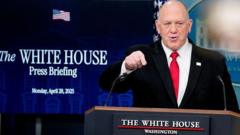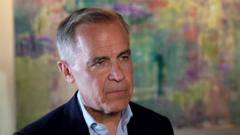The election introduces a new dynamic in US-Canada relations as both leaders stress the necessity for collaboration on economic and security matters.
Trump Commends Carney Following Election Victory, Future Meeting Planned

Trump Commends Carney Following Election Victory, Future Meeting Planned
US President acknowledges Canada's new PM Mark Carney’s win amid crucial economic talks ahead.
US President Donald Trump has reached out to newly elected Canadian Prime Minister Mark Carney to extend congratulations following Carney's successful bid in Canada’s recent general election. The two leaders have decided to schedule a meeting soon to discuss their countries’ economic and security strategies during this transformative period.
Significantly, the Canadian elections have positioned Carney's Liberal party to govern with a minority, securing 169 seats while falling short of the 172 needed for a majority as reported by public broadcaster CBC. Trump's prior remarks regarding tariffs and issues of Canadian sovereignty loomed over the election, likely complicating Carney's immediate governance and negotiation challenges.
In their first conversation post-election, Trump acknowledged the importance of a collaborative relationship between Canada and the United States, emphasizing their identities as independent nations. Moving forward, Carney faces the task of partnering with other political factions to advance legislation through a potentially contentious House of Commons.
With the Liberal party needing support from others, including the left-leaning New Democrats and Bloc Québécois, Carney’s administration must navigate a landscape marked by cooperation. Bloc leader Yves-François Blanchet suggested that political stability must be prioritized during trade negotiations with the US, advocating a temporary truce among parties.
The White House responded to Carney's election victory, with Deputy Press Secretary Anna Kelly noting that the result does not alter Trump's long-term vision for closer ties with Canada. Carney, however, has resisted the notion of Canada becoming a "51st state," advocating for a trade and security partnership that aligns with Canadian interests.
On domestic fronts, Carney is also poised to tackle significant issues such as the housing crisis and tax reforms targeted at supporting lower- and middle-income families. As the prime minister prepares for the upcoming G7 summit in Alberta this June, he is confronted with the expectation of addressing both internal and external challenges.
In contrast to the rise of the two major parties, smaller parties like the NDP have seen diminishing support, leading to leadership changes within the political landscape. This election had a voter turnout of 67%, reflecting a shifting tide in Canadian political engagement.





















